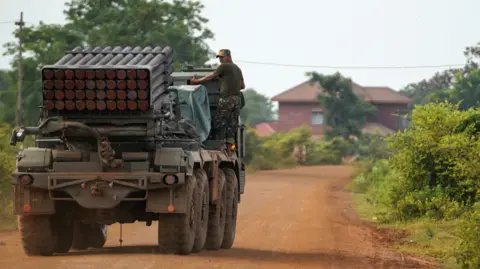In recent developments concerning border tensions between Thailand and Cambodia, both nations have expressed their gratitude to former U.S. President Donald Trump for his efforts in mediating a ceasefire. Following a series of violent clashes that escalated on July 24, 2025, Trump reached out to the leaders of both countries, urging an immediate end to hostilities. Despite his intervention, unfortunately, shelling and military skirmishes persisted along the border even after the diplomatic overtures were made.
Trump took to Truth Social to announce his communications with Thai Prime Minister Phumtham Wechayachai and Cambodian Prime Minister Hun Manet, conveying that both leaders were inclined to renegotiate terms for peace. In his post, he indicated that the two nations had “agreed to immediately meet and quickly work out a ceasefire and, ultimately, peace.” This message was welcomed by both countries, with Cambodia signaling its openness to ceasefire negotiations while Thailand emphasized the importance of dialogue prior to any commitments.
However, despite the positive tones in the responses to Trump’s outreach, realities on the ground remained starkly different. Reports indicated that military actions continued overnight along the contentious border, which has a history marked by disputes over territory. The clashes have resulted in casualties, with at least 33 soldiers and civilians killed and tens of thousands displaced from their homes since the onset of fighting.
From Cambodia’s perspective, the diplomatic approach comes from a position of diminished military strength and a desire to avoid further losses. Prime Minister Hun Manet firmly stated that Cambodia is aligned with the concept of an immediate and unconditional ceasefire, recognizing that Trump’s involvement could help save lives during this ongoing conflict. Despite expressing willingness to cease hostilities, Thailand has maintained its stance that any cessation of fire would require assurances of genuine intent from the Cambodian government. The Thai Prime Minister conveyed his appreciation for Trump’s concern but reiterated that the framework for dialogue needed to precede any actual ceasefire.
In a broader context, Trump also indicated a potential return to trade talks contingent upon a cessation of violence. Notably, impending U.S. tariffs set to take effect on August 1 pose significant economic challenges for both Cambodia and Thailand, with a proposed tax of 36% on goods imported from these nations unless diplomatic agreements are reached. Trump’s remarks suggested optimism for future trade relations, conditional on a peaceful resolution of the ongoing conflict, but highlighted the complexities of negotiating amidst an active military confrontation.
Add to this, the recent remarks from Thailand’s Foreign Minister Maris Sangiampongsa indicate that the government does not seek external mediation at this junction, even as Malaysia has previously offered to facilitate discussions between the two nations. This stance illustrates the ongoing complexities of diplomacy in the face of historical tensions that date back to colonial times when borders were established under French jurisdiction in Cambodia.
The border dispute, which escalated due to divergent claims from both nations regarding military aggressions, reflects deeper-seated historical grievances and nationalistic sentiments that complicate resolution processes. Both Thailand and Cambodia have accused each other of initiating the recent spate of violence, underscoring the fragile balance of power and trust that exists in the region.
As both nations navigate this tumultuous relationship, the international community observes with concern, noting the fragile security dynamics not only for the involved nations but also for regional stability more broadly. The unfolding situation poses significant humanitarian implications while highlighting the essential role of effective diplomacy amid conflict.












